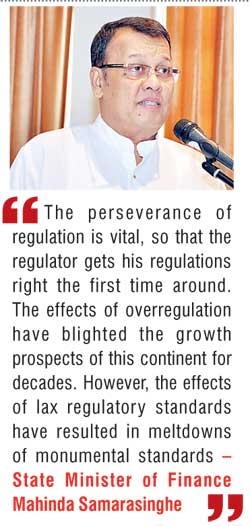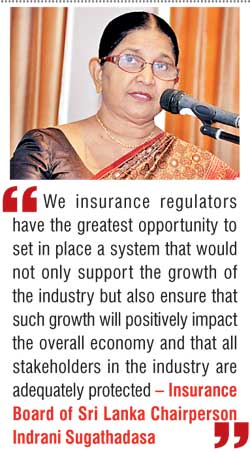Wednesday Feb 18, 2026
Wednesday Feb 18, 2026
Tuesday, 28 July 2015 01:29 - - {{hitsCtrl.values.hits}}
By Shehana Dain
The 10th Asian Forum of Insurance Regulators (AFIR) kicked off in Colombo yesterday for the first time to share key insights in to the changing landscape.
Hosted by the Insurance Board of Sri Lanka (IBSL), around 34 insurance regulators from 14 jurisdiction in the Asian region are meeting for the two-day forum.
FIR is a regional corporation mechanism of insurance regulators in Asia and acts as an important platform for insurance regulatory exchanges among members. The member countries have taken turns of host this annual event and the incumbent chair is the China Insurance Regulatory Commission.

Insurance regulators from China, Taiwan, Japan, Macau, Maldives, Hong Kong, Malaysia, Papua New Guinea, Pakistan, Philippines, Korea, Singapore and Thailand were present at the conference. The Secretary General of IAIS along with delegates from Access to Insurance Initiative (A2ii) Asian Development Bank (ADB) and the Organisation for Economic Co-operation and Development (OECD) attended the conference. The official website of AFIR was also launched during the inauguration of the conference.
The theme of this year’s conference is ‘Changing Landscape in Insurance Regulation’. The two-day event will cover informative sessions on IAIS’s (International Association of Insurance role in promoting Insurance Capital Standards (ICS).
Sharing experience on new capital regimes, the conference will include an ADB high level round table discussion on self assessment and peer review of insurance Core Principles (ICPs) and a panel discussion on developing a common regulatory framework for inclusive insurance.
The conference will also share experience in developing micro-insurance regulatory framework and the way forward for AFIR, which are vital topics of common interests to Asian insurance regulators.
The role of a regulator
Chief Guest State Minister of Finance Mahinda Samarasinghe said that the Sri Lankan regulatory body for the insurance industry, IBSL, was tasked with ensuring that the insurance business in Sri Lanka was carried on with integrity and in a professional manner with a view to safeguarding its current and potential policy holders. He further stated that IBSL should also play an advisory role to the Government of Sri Lanka by providing advice about developments of the insurance industry.
“A regulator is an entity that performs an intermediary function of sorts by providing a filter between the business of insurance on ground level and enactment of policy by legislation,” Samarasinghe added.
Commenting on the Sri Lankan insurance industry, Samarasinghe professed: “The Sri Lankan insurance industry though small in size is nonetheless a very vibrant and competitive sector, comprised of 29 insurance companies and 57 insurance brokering companies offering services to a market that’s increasingly urban and poised for exponential growth in the near future.”
Stressing the need for a balanced regulatory system, Samarasinghe said: “The perseverance of regulation is vital, so that the regulator gets his regulations right the first time around. The effects of over regulation have blighted the growth prospects of this continent for decades. However the effects of lax regulatory standards have resulted in meltdowns of monumental standards.”
Role of regulation in insurance industry
Delivering the welcome address Insurance Board of Sri Lanka Chairperson Indrani Sugathadasa said that the regulations put in place in the insurance industry were vital in the long run.
 “The insurance industry being a strong pillar of the financial sector of a country aids in the facilitation of trade and allows for the efficient allocation of resources in its economy and it is therefore in this respect that the regulation of the insurance industry takes on added significance as an efficient regulatory mechanism would ensure that the business of insurance will be pursued with integrity and professional manner for the benefit of the entire economy,” she said.
“The insurance industry being a strong pillar of the financial sector of a country aids in the facilitation of trade and allows for the efficient allocation of resources in its economy and it is therefore in this respect that the regulation of the insurance industry takes on added significance as an efficient regulatory mechanism would ensure that the business of insurance will be pursued with integrity and professional manner for the benefit of the entire economy,” she said.
Explaining the importance of the conference to the Asian region, Sugathadasa noted: “Asia is experiencing exponential growth and the insurance industry is expected to form the vanguard in the development of the financial sector of this unique continent. This conference will undoubtedly provide the opportunity to insurance regulators to discuss and deliberate on the future of the industry as well as how regulations will impinge on the industry’s further growth.”
She further stressed that even though countries differ in performance, all countries face common complications. “The insurance industry in Sri Lanka is small in comparison to some countries. The performance levels of the industry such as the gross written premium, total assets, penetration as a percentage of GDP and insurance density would differ from one country to the other, depending on monetary policies and other socio economic conditions in those countries. However we the members of the Asian insurance family have some common issues unique to us, which need our collective attention.”
Highlighting the importance of regulators to make sure all stake holders are protected Sugathadasa said: “We insurance regulators have the greatest opportunity to set in place a system that would not only support the growth of the industry but also ensure that such growth will positively impact the overall economy and that all stake holders in the industry are adequately protected.”
International cooperation is vital
Speaking at the conference, China Insurance Regulatory Commission Chairman Xiang Junbo emphasised on the need for insurance regulators to seek a higher level of international cooperation in order to face the challenging financial markets.
“The worldwide distress due to the financial crisis has clearly demonstrated that financial crises in today’s information age can no longer be contained within the border of any single country,” Xiang said.
He noted that none of the financial supervisors were capable of preventing this type of crisis and that these types of deficiencies were particularly prominent when risks cross markets and borders. “All these issues are the very reason for global reforms and  enhancement of regulatory cooperation,” he added.
enhancement of regulatory cooperation,” he added.
Lack of financial innovation
Xiang noted that in Asia, many financial and insurance regulatory entities in the emerging market often lacked financial innovation. “In terms of risk management and internal control, they often cannot effectively learn regulatory technologies, tools, experiences and practices from mature markets. These markets on one hand have tremendous difficulty in meeting existing regulatory reforms due to constraints in current conditions and on the other hand they also show a strong desire to be part of the global community.”
He went on to say that such uncertainties could be minimised through effective supervision, risk mitigation and promoting development in the Asian insurance market.
Continuous improvement
Xiang also highlighted the importance of continuous development to propel further development: “The global environment has been undergoing many changes since the establishment of AFIR but every AFIR annual conference is quickly adapted to global conditions, responsive to the concerns of our members.”
He explained that regulatory reform of the global financial insurance sector was entering an important phase. “Increasingly complex marketing and changes in the systems are bringing a broad and far-reaching effect in the global insurance industry.”
He also stressed that AFIR was now in a critical stage, calling for innovation at a higher level as it was no longer able to keep pace with the rapid development in Asia.